|
|
|
Sort Order |
|
|
|
Items / Page
|
|
|
|
|
|
|
| Srl | Item |
| 1 |
ID:
190813
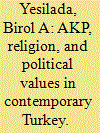

|
|
|
|
|
| Summary/Abstract |
The Justice and Development Party (AKP) came to power in 2002 with the promise of reforms to further democratic consolidation in Turkey. At that time, the AKP represented a rainbow coalition of individuals from the previous Islamist parties and many liberal democrats who were fed up with the failures of old secular political parties. The Turkish public shared their frustrations and overwhelmingly supported the AKP. Unfortunately, these reforms did not last. Today, it is indisputable that under the rule of the AKP, and more specifically, President Recep T. Erdoğan, Turkey has become an authoritarian state defined and shaped by one person. This article explores what these developments mean for the future of Turkish democracy as the country celebrates its centenary, and it includes an examination of whether Turkish political culture is supportive of such changes.
|
|
|
|
|
|
|
|
|
|
|
|
|
|
|
|
| 2 |
ID:
190809
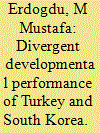

|
|
|
|
|
| Summary/Abstract |
Turkey’s per capita income was nearly three times South Korea’s in 1962. Dramatic change has been observed since then. South Korea has transformed into an innovative economy approaching the global technology frontier in only a few decades. Turkey, on the other hand, has attained limited success with missed opportunities and has fallen behind. This article asks why this spectacular success was observed in South Korea, but not in Turkey. It seeks an answer by concentrating on certain variables that may explain this outcome. Assuming that primarily different types and capacities of societies and states explain the variations in economic performance, the article examines in particular, the institutional foundations of Turkish and Korean societies.
|
|
|
|
|
|
|
|
|
|
|
|
|
|
|
|
| 3 |
ID:
190819
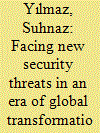

|
|
|
|
|
| Summary/Abstract |
Turkey's geopolitical position at the intersection of numerous conflict-laden regions has compelled Ankara to prioritize hard security concerns in defining its foreign and domestic policies. While these concerns will maintain their significance, new global threats and opportunities, particularly in energy security, climate change, and sustainability, necessitate a reconceptualization of security. This study posits that this new conceptualization must be more comprehensive by integrating these new challenges into conceptions security. After presenting pressing transformations in the energy security and climate change realm, the critical puzzle that the article will explore is Turkey's main challenges and opportunities in meeting its rapidly increasing energy needs on the one hand and facing mounting climate change and sustainability-related risks on the other. Moreover, the study will examine the domestic and foreign policy implications of these transformations in times of global changes and uncertainties.
|
|
|
|
|
|
|
|
|
|
|
|
|
|
|
|
| 4 |
ID:
190812
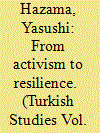

|
|
|
|
|
| Summary/Abstract |
This article discusses the behavior of the Constitutional Court in Turkey. As the highest court in the country, it is responsible for many decisions that have shaped the course of Turkish politics over the past six decades. It begins with a brief overview of the institutional features of the Turkish Constitutional Court. It then looks at major arguments on constitutional review, including judicial independence and court-curbing. Finally, it examines change and continuity in the attitudes of the Court based on the speeches of its presidents. One conclusion is that the Constitutional Court has transformed itself from that of the defender of the state principles to that of the defender of human rights while retaining its role with regard to the separation of powers. This transformation has been driven by both internal and external pressures: the domestic transition of tutelary democracy to competitive authoritarianism and the equivocation of domestic laws with international treaties.
|
|
|
|
|
|
|
|
|
|
|
|
|
|
|
|
| 5 |
ID:
190818
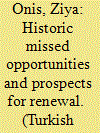

|
|
|
|
|
| Summary/Abstract |
Turkish-European Union (EU) relations in the broader context of the transatlantic alliance have been one of the defining features of Turkish foreign policy in the post-war era. The article identifies elements of the cyclical nature of the relationship and missed opportunities, notably in the 1970s and the early 2000s, which have been costly both to Turkey and the EU. Domestic politics and crises both in Turkey and the EU have played an important role in shaping the long-term dynamics of this complex and mutually important relationship. The emerging post-Western order has contributed to the decline and recent stalemate in Turkey-EU relations. The article probes into the possibilities of a revival in Turkey-EU relations and consider whether the Russian war against Ukraine will create a new opportunity for a revival of the relationship as part of a new wave of enlargement, which was not on the agenda previously.
|
|
|
|
|
|
|
|
|
|
|
|
|
|
|
|
| 6 |
ID:
190805


|
|
|
|
|
| Summary/Abstract |
Turkish Republic was founded as a new state, a homeland for Turks, and on a Turkish identity that had yet to be created which would serve as the basis of the political community. This paper analyzes the overall regime properties of the Turkish political system in that period, which has been mired in legitimacy and national identity crises. This paper identifies the varying substance and style of successive Turkish political regimes, examine the domestic and international factors influencing their changing characteristics. The frequent change in the nature of Turkey’s political regime have been major sources of its political instability.
|
|
|
|
|
|
|
|
|
|
|
|
|
|
|
|
| 7 |
ID:
190808


|
|
|
|
|
| Summary/Abstract |
Prominent themes in Turkey’s political development are modernization and Westernization, notions that carry with them a particular teleology in terms of expected political outcomes. While Turkey has, over several decades, modernized in several respects, Westernization has arguably been much more limited, particularly in terms of embracing political liberalism. This paper scrutinizes its failure to take root in Turkey, noting how a congruence of factors at both the mass and elite levels tends to work against policies that would embrace individual rights and freedoms, pluralism, and a more limited role for the state. It focuses in particular on three periods in Turkish history when liberalism could have potentially been adopted, but ultimately failed to succeed.
|
|
|
|
|
|
|
|
|
|
|
|
|
|
|
|
| 8 |
ID:
190815
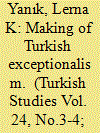

|
|
|
|
|
| Summary/Abstract |
This article has two main goals. The first is to examine the role of politics of space and time in making Turkey’s international relations. The second is to answer a more general question: what happens to a non-Western state like Turkey that cannot eliminate ‘differences’ that mark that state as non-Western? My answer is that these states handle these ‘differences’ that do not entirely disappear by creating exceptionalism. Exceptionalism rebrands ‘difference’ as ‘distinctiveness’ that can only be possessed by a specific country or nation. The article identifies two main pathways to the creation of Turkish exceptionalism, space and time, and explores the brief history of these spatio-temporal imaginations leading to the making of the exceptionalist narrative and their implications for Turkey’s foreign relations and identity.
|
|
|
|
|
|
|
|
|
|
|
|
|
|
|
|
| 9 |
ID:
190807
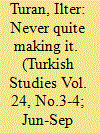

|
|
|
|
|
| Summary/Abstract |
The article addresses the question of impediments to the consolidation of democratic governance in Turkey. Historical path dependence (weight of history), cultural bifurcation emanating from Turkey’s modernization strategy, the legacy of the single party experience, the choice of particular economic development policies, and the role of individual leaders are examined with a view to how each may have contributed to a comprehensive set of difficulties Turkey has encountered in its efforts to evolve into a democratically governed society.
|
|
|
|
|
|
|
|
|
|
|
|
|
|
|
|
| 10 |
ID:
190811
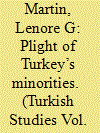

|
|
|
|
|
| Summary/Abstract |
Turkey’s numerous issues with its main minority groups, Kurds, Alevis, Christians, and Jews, continue to disrupt its domestic peace and complicate its foreign relations. In building a nation the founders of the Republic and successive governments have sought to compel minority assimilation with harsh measures such as expulsion, deprivation of property, resettlement, and discrimination, while ignoring anti-minority violence. As a result, most Christians and Jews have emigrated, though Alevis and Kurds more actively continue to demand recognition and equality. To address these issues Turkey might look to other members of the Council of Europe for examples the Republic could adopt to balance minority rights with national loyalty.
|
|
|
|
|
|
|
|
|
|
|
|
|
|
|
|
| 11 |
ID:
190814
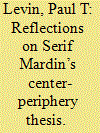

|
|
|
|
|
| Summary/Abstract |
It would be an understatement to say that Şerif Mardin’s center-periphery thesis (CPT) has been influential on contemporary understandings of Turkey. This essay reflects on the impact of the CPT, considers the challenges from both critics and a changing empirical reality, and discusses whether it still has something to offer us today. It argues that some of the criticisms levied at Mardin’s thesis are based on a misunderstanding of the role of simplification in social science, while others point to important shortcomings of the theory without presenting an alternative framework. However, the article suggests that the anomalies in the CPT have by now amassed to the point that it no longer serves as a meaningful approximation of key dynamics in Turkish politics, primarily because it fails to capture the importance of the Kurdish issue and the consolidation of the ruling AKP at the center.
|
|
|
|
|
|
|
|
|
|
|
|
|
|
|
|
| 12 |
ID:
190806
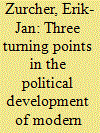

|
|
|
|
|
| Summary/Abstract |
This essay investigates the choices made by the Turkish political leadership at three crucial moments in the history of Turkey between World War I and the Cold War. It asks the question if viable alternatives to the chosen route were available, and to what extent the choices made reflected international developments of the time. The episodes looked at are the establishment of a nation-state and of a republic (two separate issues) in 1920–23, the turn towards authoritarianism during the World Crisis (1930–32) and the transition to multi-party democracy in 1945–50.
|
|
|
|
|
|
|
|
|
|
|
|
|
|
|
|
| 13 |
ID:
190816


|
|
|
|
|
| Summary/Abstract |
This article explores the general characteristics of Turkey’s foreign policy in long durée by introducing the concept of a modified middle power. It argues that its historical legacy, the ambiguity of its regional belonging, and its real and constructed pivotal geography have modified Turkey’s ‘middlepowerness’ and led to its in-betweenness. As such, the Turkish Republic, in its 100 years of history, has developed different strategies that aim to both remedy and sustain this in-betweenness. It is argued that this characteristic has been Turkey’s contribution to global politics. Yet, during the AKP rule, especially since the 2010s, Turkey’s in-betweenness has been undermined, ultimately weakening Turkey’s position and role.
|
|
|
|
|
|
|
|
|
|
|
|
|
|
|
|
| 14 |
ID:
190817


|
|
|
|
|
| Summary/Abstract |
Recent years have witnessed increasing questions regarding Turkey’s international orientation. Many have defined Turkey as an over-ambitious middle power, a categorization similar to traditional middle power identity, yet also evincing a strong determination on the part of Turkish decision makers to transform Turkey into a regional power that has the potential to become a great power sometime in future. This essay examines why Turkey’s over-ambitious middle power strategy has failed in producing the expected outcomes and why adopting the strategy of restrained middle power will serve Turkey’s national interests much better at a time of great upheavals, polarization, and uncertainties in international politics. The restrained middle power strategy can be justified on both realist and liberal grounds.
|
|
|
|
|
|
|
|
|
|
|
|
|
|
|
|
| 15 |
ID:
190810


|
|
|
|
|
| Summary/Abstract |
This article explores Turkey’s century-long asylum policies by highlighting two enduring policy considerations. The first is Turkey's process of convergence with the norms and principles of the global refugee regime. The second is the persistent practice of granting refugees protection of a temporary nature. These two policy considerations are discussed by employing the conceptual frameworks of ‘policy diffusion’ and the ‘nationalizing migration state.’ The study concludes that Turkey’s asylum policies have been shaped by the tension between these two policy considerations over the past century.
|
|
|
|
|
|
|
|
|
|
|
|
|
|
|
|
|
|
|
|
|